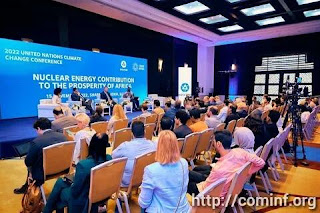Many
speakers did not skimp on whipping up anxiety and tension. Humanity is heading
towards climate hell, United Nations Secretary-General António Guterres said
dramatically at the opening of the COP27 climate conference in Egypt.
The disagreements between the participants were so great that they had to work even at night. Because of this, the event dragged on for two days more than planned. It was also possible to agree on the creation of a compensation fund for the poorest countries.
“Millions
of people around the world will now feel a glimmer of hope that a way will be
quickly found to end their suffering,” Egyptian Foreign Minister and Summit President
Sameh Shukri said at the closing plenary session.
What are
these compensations? These are payments to the poorest countries, which, due to
the weakness or lack of their own industry, cause the least damage to the
climatic state of the planet, which were promised by Austria, Belgium, Denmark,
Canada, New Zealand, France, Germany, Scotland (separately from Great Britain),
etc.
Shukri
urged other developed countries to follow the example of those who have already
pledged funding. Not all delegations were satisfied with the final agreement.
“We,
together with many participants, have proposed a number of measures that would
contribute to the achievement of peak emissions by 2025, as scientists advise. This
text does not. A clear implementation of the goal of abandoning coal is not in
this text. A clear commitment to phase out all fossil fuels is not in this
text. In the last minutes, the text on energy has been loosened,” Alok Sharma,
president of the previous COP26 conference from the UK, told the plenary.
However,
the UK has its own ambitions, which are quite sensitively different from the
priorities of other participants. In contrast, New Zealand previously announced
around $12 million in funding to combat climate change impacts at COP27.
Austria
plans to allocate $50 million to the fund over four years, Belgium is
allocating $2.5 million to help Mozambique.
Under the
2015 Paris Climate Agreement, the world will have to keep global average
temperature increases "well below 2 degrees" by 2100 and "make
efforts" to limit warming to 1.5 degrees. Now, according to the UN,
humanity is on the way to warming by 2.8 degrees.
What
activity of the participants, what optimistic statements, what commendable
unanimity, despite the understandable nuances. If you do not know the processes
taking place outside the walls of the conference room, then there may be a
distorted idea of the real picture of what is happening, the real state of
the struggle against the adverse impact of technogenic factors on the state of
the climate.
Meanwhile,
showing feigned concern for the climate and shedding crocodile tears from high
stands, the same participating countries are actively negotiating with
suppliers of traditional fuels, withdrawing thermal power plants operating on
coal and fuel oil from mothballing, and plan to resume the operation of
previously shut down nuclear power plants. This is in no way linked with the
loud statements that, allegedly, the priority for them is the development of
"green" energy.
The
President of Poland, Andrzej Duda, spoke most frankly, I would even say, very
cynically and mockingly: “Climate goals should not be more important than
energy security, especially in countries where there is a winter period.”
Unfortunately,
the main thing was left out of the brackets of the summit. Namely, the reason
for the disastrous energy situation in Europe, which makes all the good wishes
of the summit participants, all discussions and breaking copies into ephemeral
Manilovism. The root of these troubles, like many others, lies in the vicious
practice of the Europeans blindly following the US-imposed requirements to
abandon Russian energy carriers, as well as following the concept of developing
generation from renewable energy sources without a comprehensive assessment of
their effectiveness. How can you treat a disease without eliminating its causes
and even without making a diagnosis? No way.
Thus,
summing up the results of the summit, we can confidently say: the conversation
about nothing ended in nothing.
Inal Pliev for IA "Res"
Source: https://cominf.org/node/1166546912



Комментариев нет:
Отправить комментарий